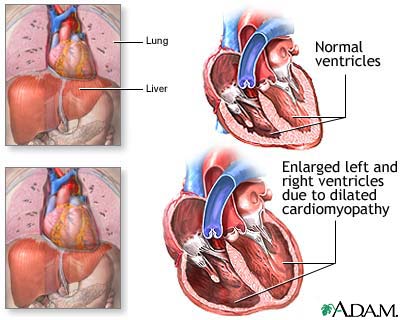 |
| Hypertensive Cardiomyopathy |
Distinct pathophysiologic in hypertension in dilated cardiomyopathy happens from extreme pressure on the systolic wall. In the overloading of right and left ventricles of systolic pressure, there is varieties of phenotypic expression that is qualitatively. This can include the dilation and systolic dysfunction but there is no thickness of the heart wall. Concentric hypertrophy with or without systolic dysfunction and vice versa is seen in hypertensive cardiomyopathy. Local neurohormonal mechanisms contributes to pathophysiology of hypertensive cardiomyopathies. The prognosis of hypertensive cardiomyopathy is possible by the existence of comorbid conditions like diabetes mellitus and diseases like coronary artery. The control of afterload too is another prognosis of hypertensive cardiomyopathy.
Hypertensive cardiomyopathy has treatment similar to ischemic dilated cardiomyopathy. The only difference is that the afterload of this heart disease has to be controlled more intensely. Pure antihypertensive vasodilators like amlodipine or a-blocking agents are added to the therapies of heart failure. The symptoms of hypertensive cardiomyopathy are similar to many heart diseases. The symptoms are fatigue, dyspnea, shortness of breath, great need to urinate at night, irregular pulse, weight gain, difficulty sleeping flat in bed, swelling of feet and nausea.
Hypertensive heart disease can give rise to complications known as cardiac arrhythmias, left ventricular hypertrophy, congestive heart failure, coronary heart disease and hypertensive cardiomyopathy. The inflammation of the heart muscles weakens the ability of the heart to pump blood into the other parts of the body. This causes lack of oxygen in the body giving rise to fatigue and restlessness. High blood pressure makes the wall of the heart to be under too much stress. Those with heart defects like congenital disease and valve disease are affected by the hypertensive cardiomyopathy or dilated cardiomyopathy. Immediate attention should be paid to those suffering from this disease. Patients with this type of heart disease must be under constant observation and not be allowed to be very stressed out.
Heart diseases are at times hereditary. In these cases, patients should not be over excited or stressed out. This leads to the formation of excess blood pressure inside the heart and the walls are inflamed not being able to take the pressure. The valves and arteries inside the heart are unable to handle the pressure. The clots too should be removed in order to avoid heart complications. With care and proper medications, there is full scope of recovery.








